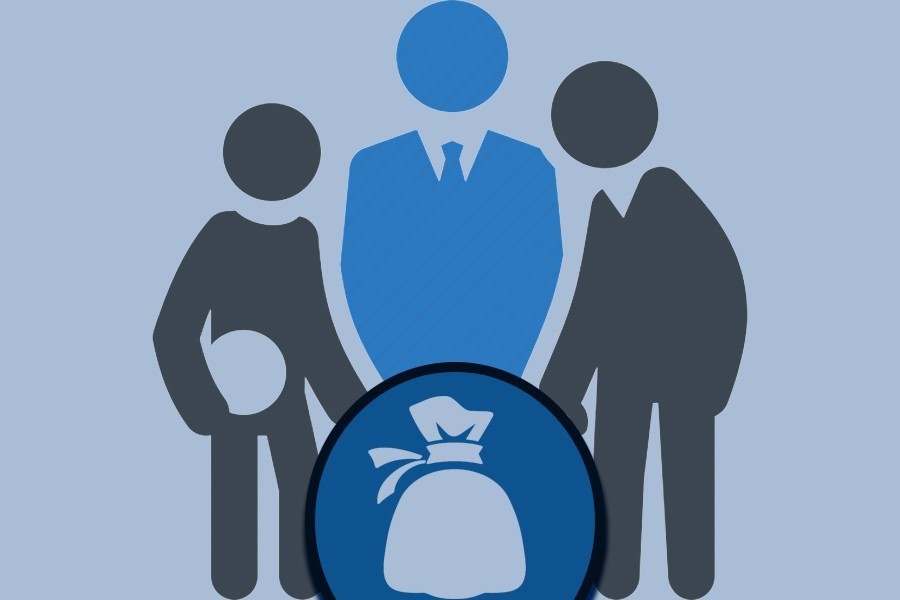
Published :
Updated :

As the time for announcement of the national Budget is drawing near, one of the issues that should figure prominently is revisiting the government's social safety net (SSN) programmes and putting in place measures to make them more effective in an inclusive and expanded format. This among other calls for addressing the needs of the already identified target groups as well as including additional groups comprising the new poor-- rendered so by the pandemic. True, the Covid pandemic sweeping across the globe for more than two years has, mercifully, not shaken the Bangladesh economy drastically as has been the case with many countries, but there are speculations that the fallout will keep lingering for sometime more, maybe a couple of years, if other things do not turn too erratic. According to experts, balancing and readjusting actions in case of unpredictable situations can be expected to be done by better management of the SSN programmes.
Introduction of SSN programmes (SSNPs), despite many odds, is a great respite for many households across the country. Although the government is trying to expand the SSNPs to various vulnerable groups, and no doubt, this has been achieved to some extent, there are still large segments of the population who deserve inclusion in the programmes, for valid reasons. Mismanagement is no doubt the most alleged reasons for less than desired delivery of the programmes which, needless to say, include corruption, nepotism, absence of proper monitoring-to name some of the major lacunas in the system.
Still, there is an increasing focus these days on SSNs -- not only in the government's poverty alleviation policies but also in the public discourse. In the absence of quantifiable estimates, it is commonly believed that despite the many odds embedded in the programme, SSNs are significantly instrumental in halting the poverty graph sliding down in general, and helping out some sector-specific activities in particular.
The government is quite upbeat about the success of the SSN programmes. Increased allocations are being made to expand and deepen the coverage of the scheme. However, little effort is visible in making it work better to reach out to the target groups. Presently, the government runs well over a hundred programmes under the SSN, but corruption and misuse of funds are reportedly plaguing the operations. Moreover, although the allocation has increased over the years, it has been found to be still far less than what it should have been in terms of standard practices followed elsewhere.
The major social safety net programmes in Bangladesh can be divided under four broad categories: (i) employment generation programmes; (ii) programmes to cope with natural disasters and other shocks; (iii) incentives provided to parents for their children's education; and (iv) incentives provided to families to improve their health status. The SSNPs can also be grouped into two types depending on whether these involve cash transfers or food transfers. Around 145 SSN programmes are currently being implemented by 23 ministries, a large number of which suffer from overlapping in various forms, because of lack of coordination and monitoring of progress in a proper manner, transparency and accountability are the major problems.
At a roundtable on social protection strategy and budget held in the capital recently, it transpired that Bangladesh was spending less than half of what other countries spend as a percentage of their gross domestic product (GDP). Most middle income countries spend between 6.0 to 8.0 per cent of the GDP on social safety net programmes as against little over 2.0 per cent of GDP in Bangladesh.
The Centre for Policy Dialogue (CPD), at a webinar held recently, emphasised the importance of SSNs in the forthcoming Budget as a special and priority area to focus on. The think tank recommended bringing 143 social safety net programmes under a single window in order to move from the social safety network to social security. Given high food-price inflation and a rise in the living cost, CPD suggested that the government increase the amount of allowance to Tk 1,000 and coverage by 20 lakh elderly, widows and marginalised women all over the country. The organisation also suggested that the government consider increasing the coverage of urban-based destitute people by raising the allocation targeting slum dwellers, floating people, pregnant women and similar marginalised groups. 'Digitalisation of the database with national identification number or other national documents for proper targeting of the beneficiaries will reduce mistargeting and corruption and complexities,' it said. Alongside reforming the modus operandi of the SSN programmes, it has also been suggested that the government should provide additional support for subsidised credit programmes for the agriculture sector, both crop and non-crop, to incentivise production in the next fiscal year.
SSN programmes will definitely figure as a vital component of the upcoming national budget given all the necessary conditions that make it an issue of crucial significance at a critical time. What, however, is important is not only revamping the system in keeping with the needs with required funds but also making it more efficient.
wasiahmed.bd@gmail.com


 For all latest news, follow The Financial Express Google News channel.
For all latest news, follow The Financial Express Google News channel.